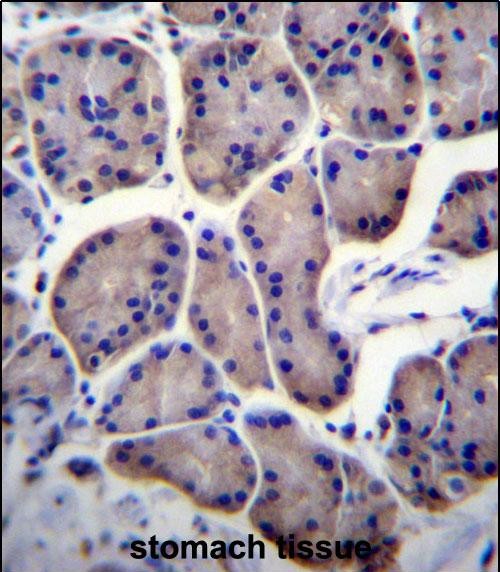

| WB | 1/1000 | Human,Mouse,Rat |
| IF | 咨询技术 | Human,Mouse,Rat |
| IHC | 1/100-1/500 | Human,Mouse,Rat |
| ICC | 技术咨询 | Human,Mouse,Rat |
| FCM | 咨询技术 | Human,Mouse,Rat |
| Elisa | 咨询技术 | Human,Mouse,Rat |
| Aliases | 60S ribosomal protein L23, 60S ribosomal protein L17, RPL23 |
| Entrez GeneID | 9349 |
| WB Predicted band size | 14.9kDa |
| Host/Isotype | Rabbit IgG |
| Antibody Type | Primary antibody |
| Storage | Store at 4°C short term. Aliquot and store at -20°C long term. Avoid freeze/thaw cycles. |
| Species Reactivity | Human, Mouse, Rat |
| Immunogen | This RPL23 antibody is generated from rabbits immunized with a KLH conjugated synthetic peptide between 49-78 amino acids from the Central region of human RPL23. |
| Formulation | Purified antibody in PBS with 0.05% sodium azide. |
+ +
以下是3篇关于RPL23抗体的代表性文献摘要(人工整理简化版):
1. **文献名称**: Ribosomal protein L23 activates p53 by inhibiting MDM2 function in response to ribosomal perturbation
**作者**: Jin A, et al.
**摘要**: 该研究使用RPL23抗体进行免疫共沉淀实验,发现核糖体蛋白LPL23通过结合并抑制MDM2对p53的泛素化降解,从而在核糖体应激时激活p53介导的细胞周期阻滞。
2. **文献名称**: Overexpression of RPL23 in myelodysplastic syndromes is associated with apoptosis resistance and poor prognosis
**作者**: Zhou X, et al.
**摘要**: 通过RPL23抗体进行免疫组化分析,发现骨髓增生异常综合征患者中RPL23高表达与凋亡抵抗相关,其过表达通过激活NF-κB通路导致疾病进展,可作为预后生物标志物。
3. **文献名称**: RPL23 mediates cisplatin resistance via positively regulating ATF4/CHOP in esophageal squamous cell carcinoma
**作者**: Li Y, et al.
**摘要**: 利用RPL23抗体进行Western blot和免疫荧光实验,证实食管癌细胞中RPL23通过调控ATF4/CHOP信号通路促进化疗耐药,敲低RPL23可增强顺铂敏感性。
The RPL23 antibody is a crucial tool in studying ribosomal protein L23 (RPL23), a component of the 60S ribosomal subunit. RPL23 belongs to the L23e family of ribosomal proteins and plays a dual role in protein synthesis and cellular regulation. Structurally, it contributes to ribosome assembly and mRNA translation. Beyond its canonical function, RPL23 interacts with the tumor suppressor p53. modulating its activity by binding MDM2. thereby influencing cell cycle arrest and apoptosis in response to ribosomal stress. Dysregulation of RPL23 has been linked to cancers, developmental disorders, and neurodegenerative diseases.
Antibodies targeting RPL23 are widely used in techniques like Western blotting, immunofluorescence, and immunohistochemistry to investigate its expression, localization, and interactions. These antibodies help identify RPL23 overexpression in certain tumors, assess ribosomal stress responses, and explore mechanisms underlying diseases like Alzheimer’s and Parkinson’s. Both monoclonal and polyclonal RPL23 antibodies are available, offering specificity for different research applications. Validation via knockout controls or siRNA knockdown is critical to ensure antibody reliability. Overall, RPL23 antibodies are indispensable for unraveling ribosome-related pathologies and developing therapeutic strategies targeting ribosomal dysfunction.
×